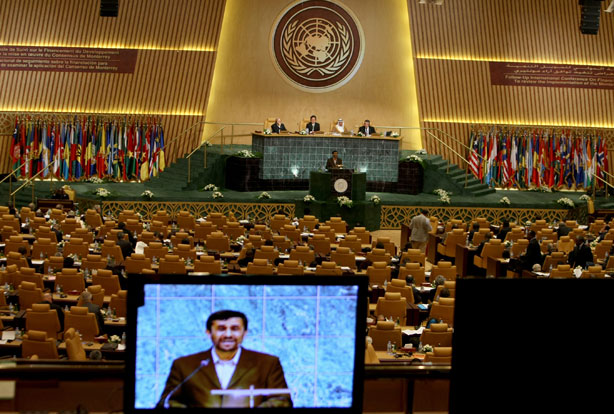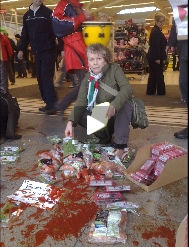The boycott campaign bears fruit in Israel’s new boycott prohibition law
July 17, 2011 — Mira VogelPalestine Solidarity Society disrupts Law lecture at Queens University, Belfast
March 1, 2011 — richardgoldengageFrom The Gown:
The Palestinian Solidarity Society today disrupted a lecture by Solon Solomon, former member of the Israeli Parliament’s legal department, on Israel’s right to self-defence. Entering the lecture, members of the society heckled the lecturer forcing it to be brought to a close after seven minutes. Members of the panel had to be removed from the room by security in the interests of their own safety to calls of “Cheerio, cheerio, cheerio.” The PSS was apparently videoing the lecture without permission.
Read the rest of the article here.
Caroline Lucas, democracy, and singling out Israel
July 8, 2010 — Mira VogelOn Greens Engage.
See also active Green Isca Stieglitz’s blog post and comments at the JC.
Naomi Chazan: “Israel’s democracy is Israel’s soul”
June 24, 2010 — richardgoldengage This is a guest post by Kubbeh.
This is a guest post by Kubbeh.
Leading Israeli academic, peace activist and president of the New Israel Fund (NIF), Naomi Chazan, was in the UK earlier this month, talking to the Jewish community about her hopes and fears for Israel’s democracy. We’ve all heard the statement that Israel is the only democracy in the Middle East. It may not be perfect (where is?), but it is true. The citizens of Egypt, Jordan, Gaza, Syria, Iran and elsewhere would all benefit from a good dose of democracy – particularly women, Christians, gay men and women, journalists and political dissidents.
Speaking earlier this month to a capacity crowd at Moishe House, a post-denominational Jewish community in west London, Chazan outlined the challenges to Israel’s democracy and what her organisation is doing about it. These reached a peak earlier this year with a well-funded smear campaign against NIF by right-wing pressure group, Im Tirtzu, which attempted to vilify Chazan and NIF as enemies of the state.
“Is there a problem [with Israel’s democracy]? Absolutely yes. Is there a hope? Equally so,” she said.
For Chazan, democracy is fundamental to the existence and success of Israel as a Jewish state:
“Israel’s democracy is Israel’s soul. Without Israel’s democracy, there will be no Israel. That is because Israel’s raison d’etre, as embodied in its Declaration of Independence, will no longer exist. The source of Israel’s strength is its democracy.”
Chazan explained how the NIF has been “thrust to the centre” of guarding Israel’s democracy, a role which she sees as crucial to upholding the Zionist dream embodied by the state’s founding fathers: “Jews have the right to self-determination in two senses,” she said. “Collective self-determination, in terms of the right to create a state for the Jews; and individual self-determination, through creating a society which grants individual liberties and social justice to all of its citizens regardless of race, religion or gender.”
She also took a swipe at anti-Zionists and boycotters, many of whom she regularly meets in academic circles, who want to see Israel relegated to the dustbin of history:“I have nothing in common with people who tell me that I have no right to exist. We need to distinguish between the deniers and deligitimisers – and dissenters.”
At a time when Israel is more politically isolated and vilified than ever before and the Islamist extremists of Hamas and Hezbollah continue to stockpile weapons to use against Israeli civilians, the work of peace and civil rights movements like NIF is more vital than ever. Israelis who want to walk the path of moderation have never had it so tough. In Chazan’s words, they are “stuck between those who don’t want to hear it and those who don’t want them to exist.” If, like me, you feel confused and frustrated about how to respond to recent events in the Middle East, then supporting the New Israel Fund is a good place to start.
Law and self-interest
June 12, 2010 — Mira VogelA piece by Adam Serwer in American Prospect dissociates the defence of Guantanamo detainees from terrorist sympathies:
“I do want to point out one flaw in the right-wing’s conspiracy theory charging that support for the rule of law is evidence of terrorist sympathies — a great deal of the lawyers who represent or have represented Guantanamo Bay detainees are Jewish. Not Jewish by birth, or culturally Jewish, but observant, even Zionist, Jews.”
Read on.
Geoffrey Alderman’s case against the University and College Union proceeds in the light of UCU’s commitment to hold employers accountable to anti-discrimination law and – what follows from that – its responsibility to treat its own members equally.
Scapegoating Muslims for the heroin trade
August 20, 2009 — Mira VogelAttributing a pestilence or catastrophe of the day to a social group is one of the most common forms of bigotry, and a point of overlap between antisemitism and Islamophobia. Blaming Jews for the financial crisis is one example. Another is the leaflets accusing Muslims of crimes against humanity which were circulated in Preston, Lancashire.
Viewing phenomena through a prism is prejudiced, and most of us are prejudiced. Prejudice is a precondition for making sense of the world; if you don’t have a prism then you experience the world as an undifferentiated barrage of happenings between which you’re unable to prioritise. But if that prism is religion, ethnicity or nationality (not to mention sex, sexual orientation, age, and other immutable aspects of identity) it is bigoted. If you’re also looking for a group on which to lay the blame, you are looking for a scapegoat. None of these ways of thinking are against the law. The incitement to hatred kicks in if you publicly castigate your scapegoat and attempt to persuade others to see things your way. At that stage you have stepped outside the law.
None of this is obvious or to be taken for granted, as the thought-out incomprehension on Stormfront about the islamophobic heroin leaflets shows.
Boycott of Israeli goods constitutes incitement to discrimination
July 23, 2009 — David Hirsh Press release issued by the Registrar
Press release issued by the Registrar
CHAMBER JUDGMENT
WILLEM v. FRANCE
The European Court of Human Rights has today notified in writing its Chamber judgment1 in the case of Willem v. France (application no. 10883/05) concerning the conviction of the mayor of Seclin for calling for a boycott of Israeli products.
The Court held by 6 votes to 1 that there had been no violation of Article 10 (freedom of expression) of the European Convention on Human Rights. (The judgment is available only in French.)
1. Principal facts
The applicant, Jean-Claude Fernand Willem, is a French national who was born in 1934 and lives in Seclin (France), a municipality of which he was mayor (for the Communist party) at the relevant time. On 3 October 2002, during a session of the town council and in the presence of journalists, Mr Willem announced that he intended to call on his services to boycott Israeli products in the municipality. He stated that he had taken that decision to protest against the anti-Palestinian policies of the Israeli Government. Representatives of the Jewish community in the département of Nord filed a complaint with the public prosecutor, who decided to prosecute the applicant for provoking discrimination on national, racial and religious grounds, under Articles 23 and 24 of the Press Act of 29 July 1881. Mr Willem was acquitted by the Lille Criminal Court but sentenced on appeal on 11 September 2003, and fined 1,000 euros (EUR). He lodged a cassation appeal but was unsuccessful.
2. Procedure and composition of the Court
The application was lodged with the European Court of Human Rights on 17 March 2005.
Judgment was given by a Chamber of seven judges, composed as follows:
Peer Lorenzen (Denmark), President,
Jean-Paul Costa (France),
Karel Jungwiert (the Czech Republic),
Renate Jaeger (Germany),
Mark Villiger (Liechtenstein),
Isabelle Berro-Lefèvre (Monaco),
Mirjana Lazarova Trajkovska (“the former Yugoslav Republic of Macedonia”), judges,
and also Claudia Westerdiek, Section Registrar.
3. Summary of the judgment2
Mr Willem took the view that his call to boycott Israeli products was part of a political debate concerning the Israeli-Palestinian conflict and was without doubt a matter in the general interest. He complained that his conviction had thus constituted a violation of his right to freedom of expression within the meaning of Article 10 of the Convention.
The Court observed that the interference with the applicant’s freedom of expression had been provided for by law, being based on Articles 23 and 24 of the Press Act 1881, and that it pursued a legitimate aim, namely to protect the rights of Israeli producers. The Court reiterated that for interference with freedom of expression, especially that of an elected representative, to comply with the Convention, it had to be “necessary in a democratic society”. Like the French courts, the Court took the view that Mr Willem had not been convicted for his political opinions but for inciting the commission of a discriminatory, and therefore punishable, act. The Court further noted that, under French law, the applicant was not entitled to take the place of the governmental authorities by declaring an embargo on products from a foreign country, and moreover that the penalty imposed on him had been relatively moderate. The Court therefore found that the impugned interference had been proportionate to the legitimate aim pursued and that there had been no violation of Article 10.
Judge Jungwiert expressed a dissenting opinion, which is annexed to the judgment.
Kenneth Marcus has paper published: “Jurisprudence of the new anti-semitism”
April 27, 2009 — David Hirsh

Kenneth Marcus
Abstract: What is wrong with the new anti-Semitism which is now resurgent across the globe, including on American college campuses? The question is deceptively simple, but it carries considerable resonance. Numerous governmental agencies, non-governmental organizations, scholars, and civil rights practitioners have documented the dangers inherent in anti-Semitism’s recent manifestations, both globally and on United States college campuses. Yet many critics still deny its existence, severity, newness, anti-Semitism, or difference from mere criticism of Israeli policies. Moreover, some argue that it is a stratagem devised to silence opposition to these policies. For this reason, it is necessary to demonstrate that persons subjected to the new anti-Semitism are harmed in a manner which should be cognizable to the law. Specifically, it must be shown how some incidents of the new anti-Semitism, which may appear to target Israel rather than individual Jews as such, nevertheless constitute prohibited forms of discrimination against Jewish Americans. Under the conventional rubrics, the question amounts to whether the new anti-Semitism abrogates anti-differentiation or anti-subordination principles. Ultimately, the answer will turn on the extent to which this new phenomenon demeans Jews, encourages anti-Jewish prejudice, and derogates Jews as morally inferior. This Article argues that the new Anti-Semitism achieves these results in part through reracialization processes which stigmatize Jews as morally blameworthy and which mark them for reprisal.
Keywords: Anti-Semitism, Judeophobia, Jewish, Discrimination, Harassment, Civil Rights, Anti-Zionism, Israel JEL Classifications: J71, J78 Accepted Paper Series
Marcus, Kenneth L., Jurisprudence of the New Anti-Semitism (April 10, 2009). Wake Forest Law Review, Vol. 44, 2009. Available at SSRN: http://ssrn.com/abstract=1376592
Is Ahmadinejad guilty of incitement under the Genocide Convention? Irwin Cotler
March 25, 2009 — David Hirsh
Ahmadinejad receives standing ovation at UN General Assembley, 2008
This piece, by Irwin Cotler, is from the National Post.
December 9 marks the 60th anniversary of the Genocide Convention, sometimes referred to as the “Never Again” Convention. Six decades have passed since this new era of genocide prevention was proclaimed in the wake of the Holocaust. On this oft-ignored anniversary, we must acknowledge our abysmal failure in preventing the most destructive threat known to humankind – the crime whose name we should even shudder to mention – genocide.
The enduring lesson of the Holocaust and that of the genocides that followed is that they occurred not simply because of the machinery of death, but because of the state-sanctioned incitement to hatred. As international tribunals have recognized and affirmed, the Holocaust did not begin in the gas chambers; it began with words. These are the chilling facts of history. Read the rest of this entry »
Swansea’s Tesco 2 and the meaning of ‘racially aggravated’
March 20, 2009 — Mira Vogel From a few sources today I’ve heard that Dee Murphy and Greg Wilkinson, two activists from Swansea Action for Palestine, have been arrested for spray-painting (blood red) a boxes of Israeli peppers and stencilling ‘boycott Israel’ on the floor of a Sainsbury’s in Swansea. They weren’t arrested for racism, but for “racially aggravated criminal damage“.
From a few sources today I’ve heard that Dee Murphy and Greg Wilkinson, two activists from Swansea Action for Palestine, have been arrested for spray-painting (blood red) a boxes of Israeli peppers and stencilling ‘boycott Israel’ on the floor of a Sainsbury’s in Swansea. They weren’t arrested for racism, but for “racially aggravated criminal damage“.
The allegation was taken badly by the activists, who retorted, “We are beginning to feel harassed for speaking out”. Activists who are charged with racially aggravated crime in relation to their anti-Israel campaigning tend to say this sort of thing – see for example the response of the Scottish Palestine Solidarity Campaign when they were charged with racially aggravated harassment against an Israeli chamber orchestra. Jenny Bourne, a “Jewish veteran anti-racist campaigner”, commented “It is an irony that whoever made this ridiculous allegation is being racist by implying that “Israeli” constitutes a race”.
I’m not sure what happened at the supermarket or whether the raids on the homes of the protesters were or weren’t appropriate. They are not thought to be dangerous and have been bailed until June. But Jenny Bourne is wrong, as far as I can see. The law in question is the 1998 Crime and Disorder Act, Section II 28 (4) of which reads:
“In this section “racial group” means a group of persons defined by reference to race, colour, nationality (including citizenship) or ethnic or national origins.”
The Home Office produced a guide to the act which includes:
“3.11 Section 28(1)(b) is the second string of the test of what amounts to “racially aggravated”. The racial hostility need not be the sole motivating factor nor does it need to be the primary one. Section 28(1)(b) makes it clear that the behaviour will be covered by the Act even if the racial hostility is only part of the motivation for the offence if the damaged property belonged, or was treated as belonging, to a Pakistani.”
So an offence can be legally defined as racially aggravated if it’s based in some way on nationality or citizenship, and when Greg Wilkinson told a friend, “the use of the words ‘Israel’ and ‘Israeli’ is no more racist than the use of, say, British, in relation to invasion of Iraq or Aghanistan”, he missed the point. The “racially aggravated” part is contingent on a crime having been committed in the first place – and it seems that the SAP activists are not denying the criminal damage.
The law exists to help the government identify racial, national, ethnic and religious elements in crimes. Basically, if the “Jewish veteran anti-racist campaigner” wants that law changed, she should look into how it is used in practice. She should search the web for, say, “racially aggravated” and the nationality of her choice (I tried Polish) to get a better impression of how it works.
It’s also worth considering that SAP don’t just “speak out”. They do inflammatory direct action with quantities of red paint. If I look at the blood-baths they create and try to work out what they want, my best guess is that they want me to hate and condemn Israel, the blood-letting state, as they do, and turn it into a pariah. In this video-recorded protest, shopping trolleys of food were overturned in the entrance of Tesco, their contents strewn over the ground and fake blood flung about to the sound of a tom-tom. Even if we could rely on the protesters for a straight story (it is unclear, whether, for instance any West Bank products are from Palestinian businesses – it would be very ironic if the products they were slinging paint over were actually the genuine article) their message is not “stop buying settlement goods” – it’s a call for a “national boycott of Israel”. Dee Murphy blurted a reference to Israel’s “sin” revealing a religious slant to her protest. As is standard, a discussion of any Palestinian role in the conflict is completely absent from SAP’s reckoning.
 But how are we supposed to protest Israel’s brutal occupation? Seems to me that if you’re an advocate for Palestinians then protesting products from the settlements which are labelled ‘West Bank’ or ‘Israel’ in a way which is misleading is very straightforward. You assert – publicly, to the supermarkets, and to your MP – your right to know whether the proceeds from the goods you are buying are helping the Palestinian economy or the settler economy. You explain why it is important to help one, and not to help the other. You need never (unless you already have a record as such, perhaps, or unless you encounter very prejudiced opponents) be misunderstood as anti-Israel or antisemitic.
But how are we supposed to protest Israel’s brutal occupation? Seems to me that if you’re an advocate for Palestinians then protesting products from the settlements which are labelled ‘West Bank’ or ‘Israel’ in a way which is misleading is very straightforward. You assert – publicly, to the supermarkets, and to your MP – your right to know whether the proceeds from the goods you are buying are helping the Palestinian economy or the settler economy. You explain why it is important to help one, and not to help the other. You need never (unless you already have a record as such, perhaps, or unless you encounter very prejudiced opponents) be misunderstood as anti-Israel or antisemitic.
So why are we still seeing so much fake blood?
Greg Wilkinson again, musing on the significance of the raid on his home:
“Still, question remains who authorised this disproportionate use of police power and numbers – thousands of pound worth of public money to get to the bottom of a box of Israeli peppers and some graffiti on a Bridgend floor?
This development shows two things:
- the campaign to boycott is beginning to bite and the Zionists have been panicked into a hasty and counterproductive response.
- Things are going to get much rougher from now on”
Those dangerous, all-controlling – but strangely ploddish – Zionists.
